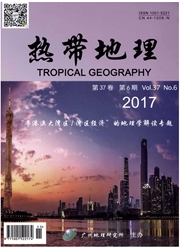

 中文摘要:
中文摘要:
人类社会文明发展的区域差异,使得不平衡地理景观成为人类发展进程中长期存在的普遍现象。然而在资本全球化的时代背景下,资本价值增殖和创造文明的二元属性在资本运动中不断建构、解构和重构地域空间,不平衡地理发展愈发明显。文章梳理了西方新马克思主义地理学关于不平衡地理发展理论的概念框架,回顾了国内外相关实证研究进展,表明不平衡地理发展与新自由主义紧密相连,资本、权力与空间成为不平衡地理发展的关键要素,但是国内外对此理论的实证研究结果却有所差异。西方发达资本主义国家的空间生产突出表现为资本积累主导下的不平衡地理发展,空间屈服于资本逻辑,而资本总是借助阶级权力来不断铲除空间障碍,促使生产要素能够在更广阔的地理范围内自由流动,从而实现资本增殖;国内的不平衡地理现象则是依赖于资本逻辑和国家政府权力的混杂互动,市场经济系统不够完善却日益深化,国家政府权力干预的强大存在并渗透到市场规则运转。最后,结合最新理论动态提出未来实证研究的发展方向,以期为国内日益显化且加剧的不平衡地理发展提供研究的新视角和实践层面的新思考。
 英文摘要:
英文摘要:
The regional difference of human civilization makes uneven geographical landscape become a common phenomenon in development process of society. However, under the background of capital globalization era, the capital with its dual attribute of value proliferation and creating civilization may mould the geographic space in the capital movement, which is increasingly obvious about the uneven geographical development. This article reviews and summarizes the framework of uneven geographical development theory about the Western New Marxism Geography and clears up relevant empirical researches at home and abroad, which indicates that the uneven geographical development is associated with Neoliberalism, and the capital, power and space play a key role in the formation of uneven geographical development theory. But, the empirical research findings are different between at home and abroad. It's distinctly dominated by the accumulation of capital in the Western countries. Through territorial organization, the capital realizes the goal of capital accumulation. In the process of value proliferation and creating civilization, it is the spatial structure of uneven geographical that makes capital flow perpetually. Naturally, uneven geographical development becomes the direct result of capital accumulation. Capitalist space is submitted to the capital logic and the production of space becomes by-product of capital accumulation. In order to solve the problem of over-accumulation of capital, it is a fact that the Neoliberalism ideology dominated by class power service to capital accumulation, it helps to eliminate space barriers so as to prompt production factors to flow freely in a worldwide geographical range. While in China it is formed by the capital logic and state power logic out of the variegated interplay. On the one hand, Chinese market economy system is underdeveloped but deepening. On the other hand, there exists a strong state government with a power intervention, even penetrating to the rules of market operation. In
 同期刊论文项目
同期刊论文项目
 同项目期刊论文
同项目期刊论文
 期刊信息
期刊信息
